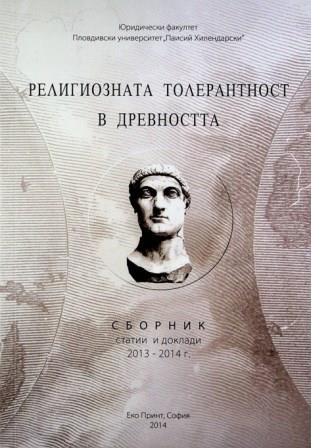Християнството в Римската империя
Christianity in the Roman Empire
Precursors of Tolerance Established by the Edict of Milan
Author(s): José Antonio Martínez Vela
Subject(s): Law, Constitution, Jurisprudence, Canon Law / Church Law, Roman law
Published by: Пловдивски университет »Паисий Хилендарски«
Keywords: christianity; Roman empire; tolerance; edict of Milan
Summary/Abstract: The article tracks the stages of the persecution of Christians by emperor Nero until the Edict is issued by emperor Galerius in 311 and The Edict of Milan in 313. The article also examines the scale of the persecutions and its ubiquity and the ideological foundation. On the basis of the analysis of some historical, legal and literary sources some of the biased concepts and conclusions have been eliminated. The main thesis is accepted that the Roman public authority intervenes by means of repressive measures only with certain cults and certain territories, when their practice has public manifestation against the Roman religious customs (mores maiorum). On the whole the hostile Roman attitude is not directed towards accepting new gods, but the ethical and customary aspect which invariably accompanies new cults and which might stand against the Roman beliefs and public morals. Ten of the main stages in the persecution of Christians by emperors Nero, Domitian, Trajan, Marcus Aurelius, Septimus Severus, Maximinus, Decius, Valerian, Aurelianus, Diocletian are examined. The article notes some of the emperors who have shown actual tolerance towards both for Christians and other religions, that were practiced by peoples in the Roman empire in the period I-III. The articles puts an emphasis on the edict of Galerius and the following period of peaceful cohabitation of Christians in the Empire that lasting nearly twenty years into Diocletian’s reign until 303.
Book: Религиозната толерантност в древността : Сборник статии и доклади 2013-2014
- Page Range: 17-31
- Page Count: 15
- Publication Year: 2014
- Language: Bulgarian
- Content File-PDF

